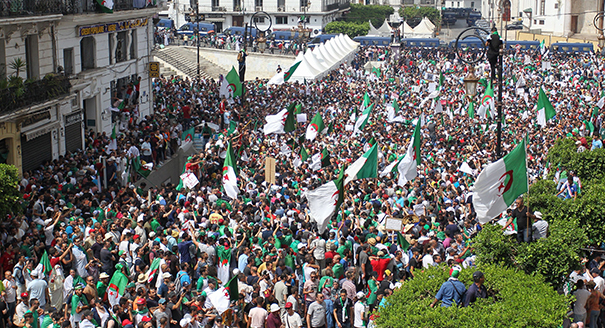The Algerian popular protests, which reached a climax in April when they forced the resignation of longtime president Abdelaziz Bouteflika, were notable for their relatively peaceful nature. But in June and July there was an increase in repression, at times violent, particularly against journalists. Many are watching as Algerians take to the streets for the twenty-first consecutive week of demonstrations, yet one country, the United States, has been conspicuously silent.
The U.S. government has only issued a few vague statements about Algeria in support of the general rights of freedom of assembly and expression, as well as the right to free and fair elections. In March, a State Department spokesperson declared that the United States “supports efforts in Algeria to chart a new path forward based on dialogue that reflects the will of all Algerians and their aspirations for a peaceful and prosperous future.” The spokesperson later reiterated, most recently in April, that the transition was a matter “for the Algerian people to decide.”
When asked on July 16 what the U.S. response was to reports of journalists being arrested and beaten, the State Department spokesperson gave an awkward and generic response about how the United States talks often about freedom of the press and freedom of religion. However, she refused to address Algeria outright.
This was in sharp contrast to the U.S. response to the protests in Sudan. There, demonstrators shared similar demands with Algerians for democratic change and economic improvement, and also successfully ousted an autocrat. Initially, the United States took a subdued line with regards to the Sudanese situation. But after Sudan’s leader Omar al-Bashir stepped down in April, ending 30 years in power, the U.S. response was far more strident in its support of a democratic transition. Washington called for “a transition to a peaceful and democratic Sudan led by civilians who represent the diversity of Sudanese society.”
Following a military takeover that led to rising tensions between Sudanese protesters and the military elite and culminated in the massacre of over 100 civilian demonstrators by the military in early June, the U.S. government amped up its engagement in the crisis. In addition to addressing Sudan’s transition in eight press statements, on June 12, the State Department appointed Donald Booth, a veteran diplomat and former special envoy for Sudan and South Sudan, to serve as special envoy to Sudan once again. On July 5, the military and protesters announced their approval of a power-sharing agreement that would establish a sovereign council, led first by a military official and then a civilian, to rule for three years while Sudan prepared to hold elections. The State Department welcomed the agreement as an “important step forward,” and it was later reported that U.S. diplomatic pressure was essential to achieving the deal.
One explanation for the divergent approaches toward Algeria and Sudan is that Algeria has long closely guarded its sovereignty and shunned foreign intervention of any kind. Therefore, it would not have welcomed U.S. public engagement on an internal issue. However, the U.S.-Sudan relationship has a rocky past that could have precluded intervention as well. With relations established after Sudan’s independence in 1956, the United States designated Sudan a state sponsor of terrorism in 1993 and spoke out against the genocide in Darfur. Washington further played an active role in negotiations for the peace agreement that would see South Sudan gain independence in 2011.
The lack of engagement on Algeria is particularly puzzling given the Trump administration’s focus on Africa. In December 2018, National Security Advisor John Bolton announced a new Africa strategy, one that would aim to advance U.S. trade and commercial ties with African nations, counteract violent threats, and ensure the efficacy of foreign aid. And on June 19 administration officials unveiled a major new initiative, Prosper Africa, at the U.S.-Africa Business Summit in Mozambique. It will provide $50 million to “substantially increase two-way trade and investment between the United States and Africa.”
Bolton, who grew increasingly frustrated with what he saw as inefficient and ineffective international engagement with Africa during his time in the George H. W. Bush and George W. Bush administrations, has pushed the Trump administration to increase the U.S. footprint on the African continent as well as better target and prioritize U.S. assistance there. Part of what is motivating the shift toward Africa is the desire to counter growing Chinese and Russian influence, which the United States views as a national security threat, as we have heard from Pentagon officials.
Given this new shift in U.S. foreign policy toward Africa, one would expect a more robust response to the Algerian protests and ensuing political crisis. However, the difference in approach to Algeria and Sudan reflects a wider issue—the administration’s schizophrenic approach toward the continent.
Washington seems unable to decide whether the countries of North Africa are a part of Africa or the Middle East. Bureaucratically, while the Defense Department and National Security Council oversee North Africa from within their respective Africa divisions, the State Department places North Africa within the Bureau of Near Eastern Affairs. This leads to a less coherent approach toward the North African subregion and the African continent as a whole. This has left North Africa behind as the administration increases its engagement with sub-Saharan African states, something that is clear in the divergent approaches toward the Algerian and Sudanese protests.
The Trump administration’s focus on Africa is a positive first step in increasing engagement with a continent often ignored by the White House. However, the motivation behind this policy—increasing U.S. private sector investment and opposing Russia and China—may mean missing opportunities to also connect with Africans over shared values. One way to start is by amplifying the voices of Algerian activists fighting for democracy and human rights and speaking out against abuses in the same way the U.S. did for Sudanese activists.






